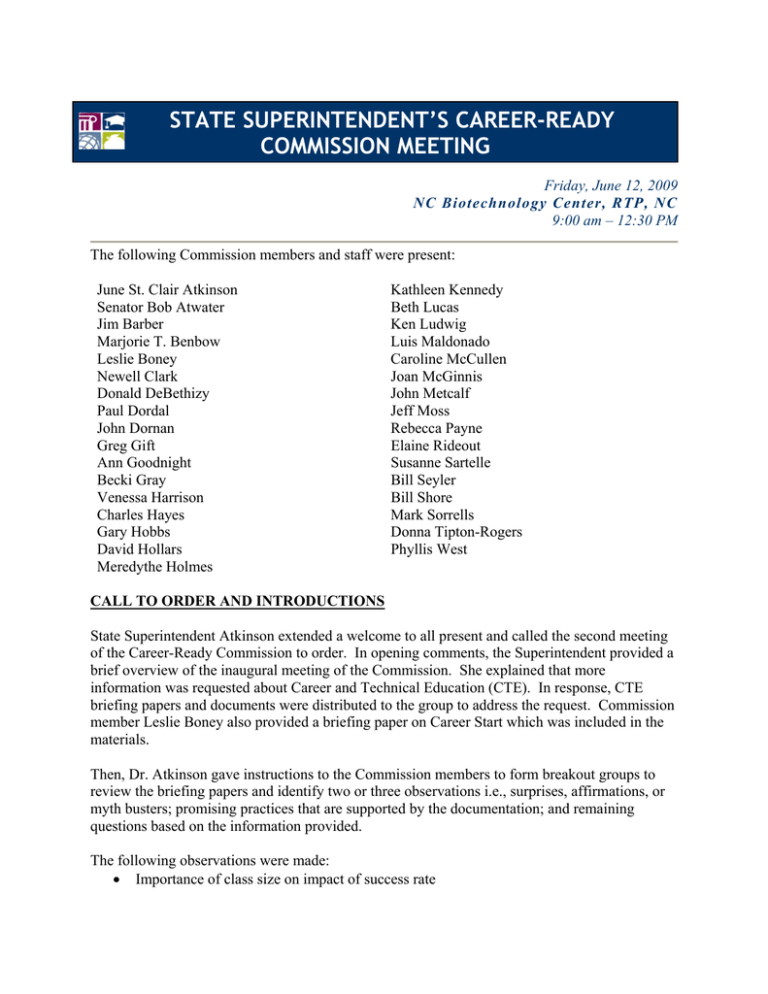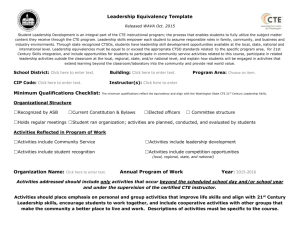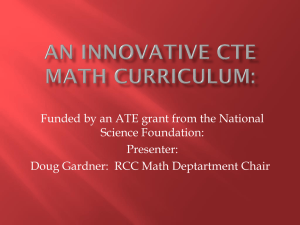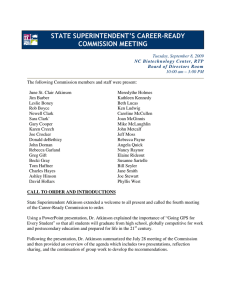STATE SUPERINTENDENT’S CAREER-READY COMMISSION MEETING
advertisement

STATE SUPERINTENDENT’S CAREER-READY COMMISSION MEETING Friday, June 12, 2009 NC Biotechnology Center, RTP, NC 9:00 am – 12:30 PM The following Commission members and staff were present: June St. Clair Atkinson Senator Bob Atwater Jim Barber Marjorie T. Benbow Leslie Boney Newell Clark Donald DeBethizy Paul Dordal John Dornan Greg Gift Ann Goodnight Becki Gray Venessa Harrison Charles Hayes Gary Hobbs David Hollars Meredythe Holmes Kathleen Kennedy Beth Lucas Ken Ludwig Luis Maldonado Caroline McCullen Joan McGinnis John Metcalf Jeff Moss Rebecca Payne Elaine Rideout Susanne Sartelle Bill Seyler Bill Shore Mark Sorrells Donna Tipton-Rogers Phyllis West CALL TO ORDER AND INTRODUCTIONS State Superintendent Atkinson extended a welcome to all present and called the second meeting of the Career-Ready Commission to order. In opening comments, the Superintendent provided a brief overview of the inaugural meeting of the Commission. She explained that more information was requested about Career and Technical Education (CTE). In response, CTE briefing papers and documents were distributed to the group to address the request. Commission member Leslie Boney also provided a briefing paper on Career Start which was included in the materials. Then, Dr. Atkinson gave instructions to the Commission members to form breakout groups to review the briefing papers and identify two or three observations i.e., surprises, affirmations, or myth busters; promising practices that are supported by the documentation; and remaining questions based on the information provided. The following observations were made: • Importance of class size on impact of success rate NC Biotechnology Center • • • • • • • • • • • • • • • • • • • • • • • • Friday, June 12, 2009 RTP, NC Availability of the number of academies across the state Interest demonstrated by students while in the academies Work to link clusters to clear career opportunities Alignment to economic development, workforce development, and education Affirmation of graduation rate data…greater than 50 percent Lack of results data Surprised by Career Start information Indication of a greater likelihood of graduating, according to college graduation data Impact on graduation rates with CTE Completers – CTE assures success Impact of relevance, rigor, and relationship Impressed with all the CTE initiatives: “Best kept successful secret in NC.” – Ann Goodnight Impact of employment rates as a direct correlation…show ready to work benefit Project Lead The Way Linkage to career opportunities and business clusters Greater career focus Linkage between class skills and the different CTE programs. Myth, “CTE is great but not for my child”, yet the data shows it can be great for any child. Other countries have had similar programs like this for years. It appears that when students are engaged the dropout rate is less. Marketing and publicity could be an issue – general public unaware about a lot of these programs and the wonderful things taking place. Concern – all but one of the programs listed have to do with the Career and Technical aspect and not the College Prep side of the curriculum, because Project Lead the Way is in 55 schools. (Science-based industry that North Carolina is trying to build is going to hire a lot of university graduates.) Sixteen Clusters and the diversity of range of those Clusters. Alignment needed for the Map Surprised by the number of programs available. Alignment could be improved. The groups identified the following promising practices: • Career Academies • Variety of programs • Alternative programs • Learn and Earn • Entrepreneurship • Career Counseling • CTSOs (Career Technical Student Organizations) • Correlation between CTE and graduation rates • Technical High Schools, i.e., Highland School of Technology • Project Lead The Way • Career Start 2 NC Biotechnology Center • • • • • • • • Friday, June 12, 2009 RTP, NC Building career skills Evaluations of programs are taking place – would like to see more How we look at the curriculum CTE as a whole Career Start seems to be making progress Anything that gives relevance to these programs. Communication needed to help the public understand that CTE courses are not less in value than those courses geared to prepare students for a College/University. Potential in building career skills. After reviewing the briefing papers, the remaining questions/requests were communicated: • Would like an overview of the workforce development regions, and how they are appointed. • How economic development boards are developed? • Can we change the teaching methodology with technology being what it is today? • How is the education of our teachers keeping pace with that and how we challenge students? • How do we take credentialing and make it more relevant to high school? (Encourage a linkage between two-year programs and high school.) • Which programs really work best? • How do we change the perception that elective courses lack the respect value given to other course such as; US History? • Could we focus on innovation instead of focusing on Entrepreneurship? • Could we make the path easier for talented science teachers that could teach microbiology to CTE classes? • Which of these programs contribute to the higher graduation rates? • How do some of these promising practices get disseminated out into a larger group? • What are the graduation rates for the Community College System and the Associate Degree programs? • Could we include graduation rates from the North Carolina Community Colleges, the University System and the Early/Middle Colleges? • What evidence do we have that it is working? • Is it the relevance element that is impacting the positive results of CTE on graduation rates? • What are the funding impacts based on the new North Carolina budget? • How do we bring CTE’s best practices to scale? • When are we going to push entrepreneurship/innovation forward; noted as the “Sleeping Giant” for our economy and our state for the future. • Where is there course alignment happening between public schools, community colleges, universities in the Career Clusters? • There is a lot of innovation that is coming out of CTE that really is creating a career approach to education. Geographically, where is this showing up? • How much overlap is there between CTE programs? 3 NC Biotechnology Center Friday, June 12, 2009 RTP, NC PRESENTATIONS Career Academies Superintendent Atkinson presented information to the Commission regarding the Highland School of Technology, located in Gaston County. Utilizing a PowerPoint presentation, Dr. Atkinson highlighted the differences (see below) between the Highland School of Technology model and typical high schools across the state. • • • • • • • • • • Organized around Career Clusters All teachers are on an 11-month contract o Teachers go to business and industry to find out what is going on in the workforce Three caring adults assigned to every student o Curriculum Coordinator o Career Development Coordinator/Guidance Counselor o A Business and Industry person Highland School of Technology has business mentors All students have some type of work experience/internships The following academies are at the Highland School o Communications/IT o Health Science o Biotechnology o Manufacturing o Engineering School of Choice Students come from various backgrounds Admission requirements, such as an attendance rate of 94 percent First high school in North Carolina recognized as a “School of Excellence.” (In order to be recognized as a “School of Excellence”, over 90 percent of the student body has to score proficient in Math, English, Science, and Social Studies) o In 2007, the graduation rate was 97 percent o In 2008, the graduation rate was 100 percent Greg Gift (Assistant Director of Career and Technical Education, NCDPI) presented information on the Central Academy of Technology and Arts located in Union County. His presentation elaborated on how this academy works and the success of the students and teachers. Commission member Caroline McCullen (Director of SAS Education Initiatives, SAS Institute, Inc.) and guest presenters Julie Oster (Director of Academy of Information Technology, Apex High School), and Samantha Heck and Cameron Will (Academy Students) discussed the Apex High School Model of Wake County. The presenters summarized how each stakeholder benefits from the initiative. Teachers and students along with business and industry members are able to contribute and give positive feedback which assists in growing opportunities for all stakeholders. Commission Member Joan McGinnis (Director of Career and Technical Education and Secondary Services, Onslow County) and guest presenter Don Herring (Division Chair for 4 NC Biotechnology Center Friday, June 12, 2009 RTP, NC Student Services, Coastal Carolina Community College) shared data which elaborated on the development and affects of the Tech Prep initiative in Onslow County. Guest presenter Tony Habit (President, NC New Schools Project) provided the final PowerPoint presentation sharing the impact of Innovative High Schools across North Carolina with the NC New Schools Project. FUTURE MEETING TOPICS At Superintendent Atkinson’s request, the following topics, suggestions, and recommendations for further discussion were identified by the participants: 1. How do we change the current perception of high school in order to offer a different structure and an integrated curriculum to make students more competitive? 2. How can we provide tools to the parents to help assist their children? 3. Discuss the obstacles and where we are with the technology. 4. Send policy to the Commission members regarding students who are not at grade level but are promoted. 5. What about the teacher than cannot change? 6. Discuss the need to coach parents, teachers, school boards, and administrators to implement systemic change. 7. Provide a map where programs are not available. 8. Cultivate the integration of curriculum and experience. 9. Market CTE programs by creating a video. 10. Workforce Development Boards 11. What are universities doing to integrate CTE curriculums? 12. Accountability The Commission was asked to reflect on any additional information that could be provided in order to make strong recommendations to move public education forward in North Carolina. The next meeting date will be held either July 28 or 29. An email communiqué will be sent to Commission members when a date is confirmed. Commission member Norris Tolson (President of NC Biotechnology Center) closed the meeting with some facts about the center. TENTATIVE NEXT MEETING: 5 JULY 28 or 29, 2009






